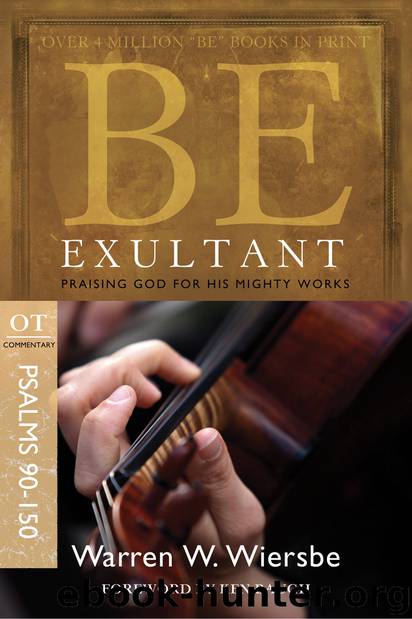Be Exultant by Warren W. Wiersbe

Author:Warren W. Wiersbe
Language: eng
Format: epub
Tags: Exultant, Psalm 90-150, commentary, praise
Publisher: David C. Cook
Published: 2012-02-12T16:00:00+00:00
Psalm 120
The psalm begins with distress (v. 1), concludes with war (v. 7), and in between deals with deception and slander. It hardly seems a fit hymn for a group of pilgrims to sing as they made their way to the sanctuary of God. However, it appears that the author of this psalm was in the same situation as the writer of Psalm 42: Circumstances prevented him from attending the feast, so he had to stay home among people who made life difficult for him (see 42:3, 9–10). The singing of this psalm would remind the pilgrims that they were indeed privileged to be able to go to Jerusalem and that others would have liked to go with them. It also reminded the travelers that when they returned home, they needed to carry some of the blessing to those who stayed behind and to help make life easier for them. The psalm reminds believers today that worship is a privilege and the blessings we receive must be shared. When we find ourselves experiencing distress and disappointment, we have three responsibilities to fulfill if our burdens are to become blessings.
1. We Must Pray (vv. 1–2). The opening phrase can be translated “I cried” or “I cry,” because the past and the present are combined in the tense of the verb. (Compare NASB and NIV) The writer had prayed in a previous time of trouble, and the Lord had answered him, so now he had confidence to pray again. Instead of complaining about his situation, he shared it with the Lord and, in this psalm, shared it with us. His problem was that people were lying about him and slandering his name. (See 5:9, 12:1–8; 26:4; 31:18; 52:3ff.; Prov. 10:18; 26:24.) It’s possible that he was involved in some kind of litigation and the opposition had bribed false witnesses to testify against him. He did not dare go to Jerusalem for fear his enemies would take advantage of his absence and do even more damage.
2. We Must Trust God (vv. 3–4). It is not likely that the psalmist was actually addressing his enemies, but this is the message God gave him in answer to his prayers. The writer did not need to attack the enemy, because the Lord would do it for him. Arrows and fire are images of their evil, lying words, images that occur frequently in Scripture (55:21; 57:4; 59:7; 64:3–4; Prov. 16:27; 25:18; 26:18–19; Jer. 9:3, 8; James 3:6). The writer was confident that God would punish the enemy with their own weapons, but the consequences would be far worse. The arrows would be sharpened and shot at them by a mighty warrior, probably a reference to the Lord God Himself (24:8; Isa. 9:6, “Mighty God”). The broom tree is a desert shrub that affords shade (1 Kings 19:4), and its roots can be made into excellent charcoal. There is so much godless speech in our world today that believers must be careful what they hear and how it affects them.
Download
This site does not store any files on its server. We only index and link to content provided by other sites. Please contact the content providers to delete copyright contents if any and email us, we'll remove relevant links or contents immediately.
The David Story by Robert Alter(548)
1 and 2 Kings by Iain Provan(534)
The Book of Psalms by Robert Alter(465)
HAMMER! by Barbara Hammer(458)
1 and 2 Chronicles by Frederick Mabie(452)
God and Sex by Michael Coogan(450)
The Message of Isaiah by Barry Webb(438)
Exploring Exodus: The Origins of Biblical Israel by Nahum M. Sarna(429)
Be Decisive (Jeremiah) by Warren W. Wiersbe(423)
The Everyday Torah: Weekly Reflections and Inspirations by Bradley Artson(416)
1 & 2 Kings (Understanding the Bible Commentary Series) by Provan Iain W(411)
Ecclesiastes, Song of Songs by Iain Provan(407)
Old Testament Commentary Survey by Longman III Tremper(381)
John Calvin's Commentaries On Genesis 1-23 by John Calvin(364)
1 and 2 Samuel (Zondervan Illustrated Bible Backgrounds Commentary) by V. Philips Long(357)
Joseph and the Way of Forgiveness by Stephen Mitchell(328)
Lamentations, Song of Songs by Wilma Bailey(311)
Women in the Biblical World: A Survey of Old and New Testament Perspectives: Volume 1 by(307)
John Calvin's Commentaries On Genesis 24 - 50 by John Calvin(307)
